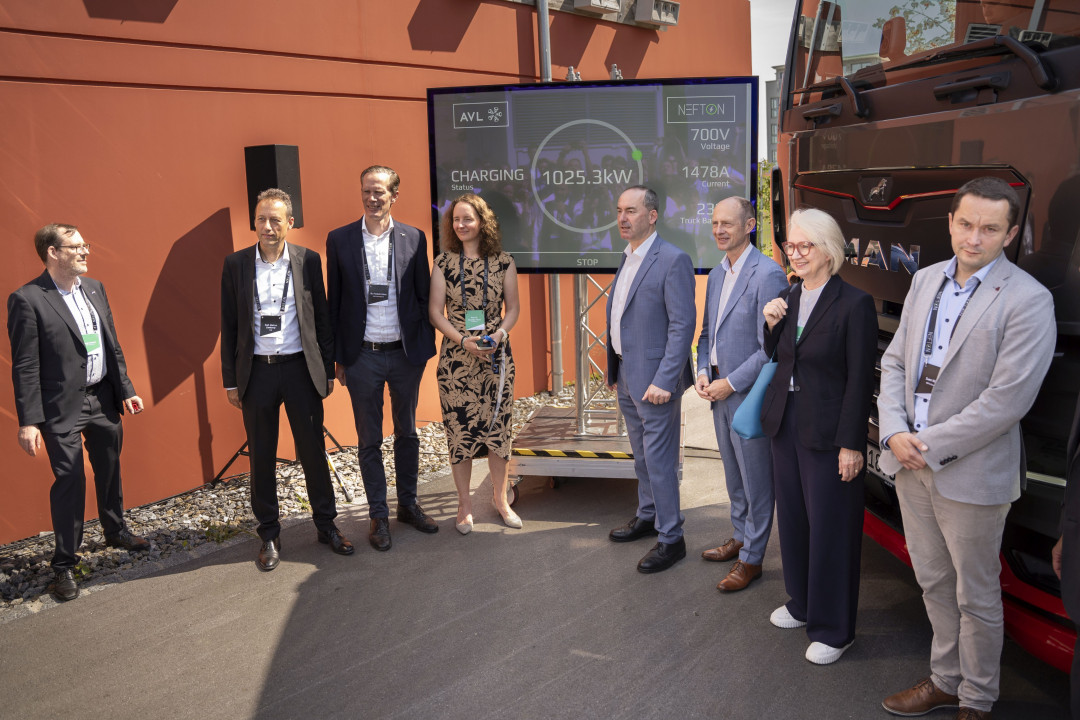
Together with partners from industry and science, the Technical University of Deggendorf (THD) is working on making battery-powered electric trucks suitable for long-distance freight transport. The megawatt charging technology represents a decisive step forward in this endeavour. The first prototypes were presented to the public at the THD Technology Campus Plattling on Friday 19 July at an event with Bavaria's Minister of Economic Affairs Hubert Aiwanger. For the first time, the charging station and the truck make it possible to charge the truck batteries for 4.5 hours of operating time within the legally prescribed driving time break – without additional waiting times.
More than 70 per cent of all goods in Germany are transported by road – mainly by diesel-powered vehicles. This has a significant impact on the environmental balance. 40 per cent of the total traffic emissions of 148 million tonnes of CO2 are attributable to freight transport. Therefore, a switch from diesel to electric drive would have a particularly positive effect. The research consortium NEFTON, under the leadership of the Chair of Automotive Engineering at the Technical University of Munich (TUM), is working on the technical and infrastructural solutions needed to achieve this.
Prof. Dr.-Ing. Otto Kreutzer, scientific director of the Power Electronics research division at THD, explains the objective as follows: ‘A key to renewable heavy goods transport is the development of innovative charging and supply solutions to limit the necessary expansion of the power grid. In Plattling, we are researching solutions that do not require additional power lines.’ And TUM Professor Markus Lienkamp emphasises: ’The scientific facts speak for themselves: battery-electric trucks have an efficiency of around 75 per cent. Fuel cell trucks, with an efficiency of only 26 per cent, and eFuels, with an efficiency of only 14 per cent, are miles away from this.’ However, the infrastructure on the main transport routes is still lacking for the actual effective use of electric trucks. The megawatt charging technology is a huge step forward in this regard.
For Anton Angermaier, CEO of AVL Software and Functions GmbH, it is clear ‘that the intelligent integration of battery buffers and the direct connection to renewable energy sources such as photovoltaics and wind power is a decisive factor for the successful expansion of the megawatt charging infrastructure and its compatibility with the power grid.’ Such a sustainable solution not only enables a stable energy supply, but also contributes significantly to the reduction of CO₂ emissions.
Dr Frederik Zohm, the board member for research and development at MAN Truck & Bus SE, said of the project itself: ‘For megawatt charging in particular, we have developed technologies with NEFTON that enable electric trucks to be charged with very high charging capacities during short stops. In addition to the technology, the research focus was on practicality, costs and grid connection capacity.’ Together with the project partners, it had been clearly demonstrated that electric trucks and megawatt charging were the perfect combination for the comprehensive decarbonisation of road freight transport. The technology was there, now it was a matter of pushing ahead with the expansion of the charging infrastructure in the market in close cooperation with politicians, the energy industry and vehicle manufacturers.
Bavaria's Minister of Economic Affairs, Hubert Aiwanger, was visibly impressed by the 1,000 kW charging process, which was probably the first of its kind in Germany, and in his speech he emphasised that ‘the research project shows that high-tech and expertise from Bavaria are shaping the mobility of the future. Such initiatives are gradually decarbonising logistics and freight transport, thereby also strengthening Bavaria as a business location. I would therefore like to thank everyone who has successfully participated in the NEFTON project. The Megawatt Charging System (MCS) in particular accelerates the charging times of trucks massively and is therefore a milestone for electromobility.’ MAN has already proven the practicality of this technology and has played a significant role in standardisation. The MCS technology also takes into account the state of Bavaria in its current funding programme. ‘In the first round, we are financing 86 charging points for road freight transport, and the next call for funding is due to start in late autumn. Together with our hydrogen funding, this programme represents the Bavarian state government's openness to technology in the field of mobility,’ said Aiwanger.

